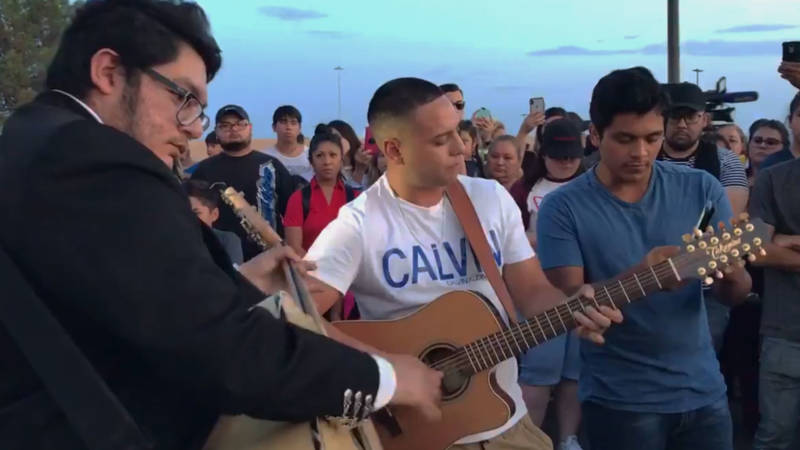Photojournalist Omar Ornelas of USA Today Network captured this scene at a vigil just one night before Donald Trump’s visit to El Paso. The corrido, “El Llanto de El Paso Texas,” attributed to songwriter Josue Rodriguez, sparked an immediate emotional outpouring from viewers, many of whom grew up listening to familiar melodies in Mexican households.
To many, it may be just a song. But for me and many others, after the deadliest attack targeting our people in recent U.S. history, it’s an act of strength and resilience we need now more than ever.
A Long Oral Tradition
The Mexican oral tradition of the corrido allows us to look critically at and heal from disturbing events. It gives us the power look death in the eye. To name it. To inspire empathy among the masses, and take action against threats on one’s freedom, sovereignty and right to live.
It’s the llanto, the collective cry that brings people together—el canto del pueblo, or the song of the people—that says: “We do not fear you. You have only made us stronger. Your hate will only bring us closer.”
As the lyrics of “El Llanto de El Paso Texas” say:
A Saturday morning on August 3,
at the Walmart in Cielo Vista
people peacefully walked,
but they could never imagine
their lives would change.
They heard several shots,
a gun unloading.
The massacre began,
and my people were scared.
The could not find where to run,
but they all helped each other.
These events that I tell you,
the news reported 22 killed,
and 26 badly injured.
El Chucho [El Paso] is sad,
many families are in mourning.
It was an act of terrorism
that this monster caused.
He wanted to break my people,
but he didn’t succeed.
Now we’re more united than ever,
many thanks to God.
Corridos, based on the Spanish word correr (“to run”), are folk songs that capture a collective cry against injustice; the musicologist Henry Cowell called them “stories told in song.” Over generations, their form of balladic storytelling became known as “border music,” although their roots predate the U.S.-Mexico border we know today.
At the outset of the Mexican revolution, cantantes would carry their guitars from town to town with songs like “La Adelita,” recounting tales of peasant soldiers and indigenous communities rising up against an elite governing class in Mexico. This creative dissemination of the news—delivered across 36 lines in 3/4 time—built a backbone to a growing resistance.
Even today, corridos put a human face on even the most difficult circumstances.
‘The Corrido Does Not Tell Lies’
In 2004, celebrated San Jose-based norteño band Los Tigres del Norte sparred with the Mexican state of Chihuahua over their corrido “Las Mujeres de Juárez.” Against a jolting, upbeat tempo, its lyrics reveal a crisis outside the north Mexican border town—mass femicide of hundreds of maquiladora workers:
Humiliating and abusive,
The untouchable impunity,
The bones in the desert
Tell the raw truth
The dead women of Juárez
Are a national embarrassment.
In the final stanza, singer Jorge Hernandez calls for an investigation into the murdered women left in the deserts of Chihuahua:
Because there are several thousands of dead women
In clandestine cemeteries
Many missing women
That I refuse to believe
It’s the people’s demand
That the law sheds light on this.
Threatening censorship, the governor of Chihuahua claimed the lyrics were too macabre for mass consumption and would incite fear in a region grappling with excessive violence. Critics argued that the real reason the state wanted to squash the song was to avoid upsetting a regional economy fueled by industrial production along the border.
Guadalupe Morfin Otero, a government commissioner who worked on the case of the murdered women of Juárez, defended the song. “It seems to me that the corrido does not tell lies,” he said. “This and other artistic expressions that have surfaced on this theme are valid when they are an expression of solidarity.”
Reclaiming the Narrative
Earlier this week, a recording of mariachis performing Juan Gabriel’s “Amor Eterno” at the El Paso vigil captivated a country grieving in the wake of three mass shootings in one week. The bolero, written by Gabriel after his mother’s death, was made popular by Spanish singer Rocío Durcal. Its heartrending rendition, illuminated by candlelight in El Paso, hit home for many Latinos, who hold the song close to their heart in times of grief and loss.
At a time when Latinos are targeted, stigmatized and falsely accused en masse, it’s critical we reclaim our own narratives. By deconstructing tragedies like the mass shooting in El Paso, line by line, the corrido provides a deeper understanding to a grieving community, and says to the rest of the world, “this is our story.”
Passed from guitar to guitar, handed down from grandparent to parent to young one, corridos like “El Llanto de El Paso Texas” help us make sense of the madness. And even in this moment of fractured families, driven apart by steel, concrete and bullets, our strength carries on.
Sobrevivimos.


